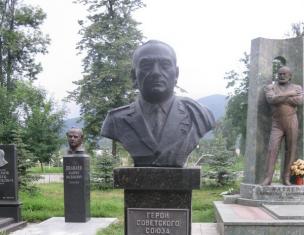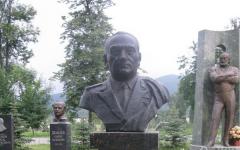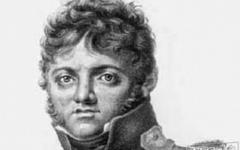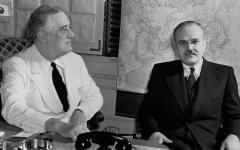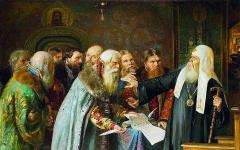The works of B. Pasternak can tell a lot about the poet’s personal life. An example of this is “There will be no one in the house.” Schoolchildren study it in 7th grade. We invite you to learn more about the poem by reading brief analysis“No one will be home” according to plan.
Brief Analysis
History of creation- was written in 1931, when the poet met Zinaida Neuhaus, the poet included the poem in the collection “Second Birth”.
Theme of the poem– loneliness, dreams of meeting your beloved.
Composition– The analyzed work is conventionally divided into parts: a story about an empty house and dreams lyrical hero about meeting the woman you love. B. Pasternak closely interweaves these parts with each other.
Genre – love lyrics.
Poetic size – tetrameter trochee, cross rhyme ABAB.
Metaphors – “only a quick glimpse of moss, white wet clods,” “and again it will draw frost, and again last year’s despondency will wrap me around,” “a shiver of doubt will run through the curtain.”.
Epithets – “winter day”, “white, wet lumps”, “unreleased guilt”.
Comparison- “You, like the future, will enter.”
History of creation
The history of the creation of the analyzed work is associated with turning point in the life of B. Pasternak. It appeared in 1931 after the poet met Zinaida Neuhaus. The woman was already legally married and had children, just like Boris Leonidovich. However, a strong feeling flared up between them, and the marriage ties could not keep Pasternak and Neuhaus close to their former halves.
Parting with his first wife and son was difficult for the poet. He felt guilty, and confusion settled in his soul, so the lyrical hero of the poem speaks of “unabsolved guilt.” Zinaida Neuhaus became Pasternak's second wife, who lived with him until last days. However, she didn't last love, because at the end of his years, Boris Leonidovich fell in love with Olga Ivinskaya.
The work “There will be no one in the house” was included in the collection “The Second Birth”, which saw the world in 1932.
Subject
In literature, B. Pasternak is better known as the author of philosophical lyrics. He admitted that he did not know how to beautifully describe emotions and feelings. However, his love lyrics amaze with their frankness and original images. The analyzed work intertwines the philosophical theme of loneliness and the intimate theme of meeting a lover.
In the first stanzas, the author's attention is focused on the house that the lyrical hero talks about. A man’s imagination pictures one of the days that should come in the future. It represents an empty house filled with twilight. This detail suggests that the hero feels lonely. It will be a snowy winter day outside. The description of snow only enhances the feeling of emptiness in the narrator’s home and soul.
The lyrical hero knows that in such an atmosphere they will definitely “be overcome... by last year’s despondency.” This psychological detail is autobiographical. With her help, B. Pasternak hints at his separation from his first wife and son. The memory of “the deeds of another winter” evokes in the lyrical hero a feeling of guilt that torments his heart.
Suddenly the man’s gaze turns to the curtain. The mental torment begins to subside, because the hero sees his beloved. He compares her to the future, hinting that he cannot imagine life without her. The image of the beloved, depicted in the last verses, resembles an angel. The woman is wearing a white, weightless robe, which symbolizes purity and the beginning of a new life.
Composition
The analyzed work is conventionally divided into two parts: a story about an empty house and the lyrical hero’s dreams of meeting his beloved woman. B. Pasternak closely interweaves these parts with each other. Formally, the poem consists of six quatrains.
Genre
The genre of the work is love lyrics. Main role Emotions and feelings play in the poems. The poem is dominated by a sad mood, which is characteristic of an elegy. The poetic meter is trochaic tetrameter. The rhyme pattern in quatrains is cross ABAB, there are male and female rhymes.
Means of expression
Artistic means serve to reveal the theme and convey internal state lyrical "I". The basis for creating tropes are the author's associations.
The poet weaves into almost every stanza metaphor: “only a quick glimpse of moss with white wet clods,” “and again it will draw frost, and again last year’s despondency will wrap me around,” “a shiver of doubt will run through the curtain.” Atmosphere winter day and the confusion of the lyrical hero are conveyed through epithets: “winter day”, “white, wet lumps”, “unreleased wine”. Comparison There is only one word in the text: “you, like the future, will enter.”
The intonation of the poem is smooth without exclamations or questions. It seems that the author does not want to disturb the silence reigning in the empty house. This intonation pattern harmoniously complements the content. In some lines the author used alliteration, for example, he conveyed an uncomfortable atmosphere with the help of the consonants “z”, “s”, “r”: “a winter day in the through opening of uncovered curtains.”
There will be no one in the house
Except at dusk. One
Winter day through the doorway
Undrawn curtains.
Only white wet lumps
A quick glimpse of moss,
Only roofs, snow, and, except
Roofs and snow, no one.
And again he will draw frost,
And he'll turn on me again
Last year's gloom
And things are different in winter.
And they stab again to this day
Unrelieved guilt
And the window along the cross
Wood hunger will suppress hunger.
But unexpectedly along the curtain
A shiver of doubt will run through -
Measuring the silence with steps.
You, like the future, will enter.
You'll appear out the door
In something white, without quirks,
In some ways, really from those matters,
From which flakes are made.
(No Ratings Yet)
More poems:
- I am not ashamed of anyone or anything, - I am alone, hopelessly alone, Why should I shyly withdraw into the silence of the midnight valleys? Heaven and earth are me, incomprehensible and alien...
- What's our forecast today, honey? What did you wake up with again out of tune? Just tell me: “Lord have mercy! What kind of whim do you mean? The most important thing is the weather in the house...
- There is no one in the world more desirable than our ugly Cinderella, Elka. I would take and eat the raisins and freckles from Elka’s neck. Where is her house? Behind the ford. What does she smell like? Honey...
- There is no one nearby, no matter how hard you breathe. Let's organize a meeting with you! Marina, write me a letter - I’ll answer you on the phone. Let it be the same as two years ago, Let...
- Don’t dare to see anyone Cover your eyes with glass and flowers Pushing away the rays of a waterfall And beautiful flags With a white blank page of paper On a black face Be like a gold watch Where...
- No one will save anyone. And everyone, like a wolf, is doomed. Neither grandmother's witchcraft, nor the great fidelity of wives will give anything, nothing. An apple fruit explodes with a toy of paper and ink. You grab everything...
- What is there in life if we don’t love anyone, When no one can love us in return, When we see nothing in the past And in the future nothing is in our hearts...
- Why, without loving anyone, do you worry so ardently about yourself? Do you want to be loved? My dear, you want too much! Do you want to be loved? For what? Isn't it because in a word...
- The name will not always be the same - they will give me another one later. More fully, more powerfully, more strictly, my path will be outlined in it. It will be in your hand like a lamp. I'll see where the darkness is...
- The night is bitter in a lonely house. At this hour - a memory that has subsided for a long time - is crying. And again in languor I drink memories like wine. There, behind the city wastelands, Behind the boulevard in the street...
- ...And again in one of the clearings Between cheerful oak trees - Half-rotten logs of dugouts And the knees of swollen trenches. Even helmets, boots, windings Time could not turn into dust... Oh, my soldiers...
- The circle of the sun, the sky around - This is a drawing by a boy. He drew it on a piece of paper and signed it in the corner: May there always be sun, May there always be sky, May there always be mother, May there always be...
- Where are you leading me, what are you singing - autumn, sleepless, scattered rain? Plucking lifeless leaves from the branches, why am I following you in reality? There is no one on the street... Only darkness silently...
- I told myself: stop writing, - But my hands ask for them. Oh, my dear mother, beloved friends! I’m lying in the ward - they’re looking askance, I’m not sleeping: I’m afraid they’ll attack, - After all, next to me -...
- There was one day when they were Not a prostitute, not a slave, But they were all human From the soul, a resurrected shrine. It was Easter, one day of the year, and the night of Christ's Resurrection, When I looked at...
There will be no one in the house
Except at dusk. One
Winter day through the doorway
Curtains not drawn.
Only white wet lumps
A quick glimpse of moss,
Only roofs, snow, and, except
Roofs and snow, no one.
And again he will draw frost,
And he'll turn on me again
Last year's gloom
And things are different in winter.
And they stab again to this day
Unforgivable guilt
And the window along the cross
Wood hunger will suppress hunger.
But unexpectedly along the curtain
A shiver of doubt will run through -
Measuring the silence with steps.
You, like the future, will enter.
You'll appear out the door
In something white, without quirks,
In some ways, really from those matters,
From which flakes are made.
1931
Analysis of the poem “There will be no one in the house” by Pasternak (1)
The work of Boris Pasternak is incredibly difficult to understand. His works are always thoroughly metaphorical and contain a secret meaning. Without knowing the circumstances of the poet’s personal life, it is not always possible to grasp this meaning. The poem “There will be no one in the house...” (1931) is directly related to important event in the life of Pasternak. This year he broke off relations with his first wife and created new family with Z. Neuhaus. This event caused a scandal and gave rise to a lot of rumors, since the woman also had a husband, who was also a friend of Pasternak.
The first part of the poem describes the poet's loneliness. He has probably already left his first wife and is awaiting the arrival of his beloved. He has time to think carefully about what happened. The loneliness of the lyrical hero is not disturbed by anyone. He dissolves in the world around him. The clarification “except” emphasizes his isolation from the human world. “Except for twilight,” “except for roofs and snow” - the presence of inanimate objects and phenomena only exacerbates the author’s loneliness.
The gloomy winter landscape sets the lyrical hero up for joyless memories. “Last year’s gloom” is probably due to the unfortunate situation family life. The author feels “unabsolved guilt.” Pasternak makes no mention of his first wife. It can be assumed that it was he who caused the breakup of the family.
The appearance of the heroine completely transforms reality. It is preceded by “doubt trembling” even on the curtain. It becomes clear that the author was waiting for his beloved with great impatience, but simply carefully hid it from the reader. He was in a timeless and spaceless state. This is emphasized by comparing the heroine with the “future.” Probably, Pasternak was not entirely sure that a woman would leave her husband for him. Therefore, he did not make any plans and did not indulge in dreams. The sudden appearance of a woman illuminated his whole life and awakened faith in a happy future.
The change in the mood of the lyrical hero is conveyed by a change in his perception of reality. If at the beginning of the work snow is associated with “white wet clods,” then in the finale the image of airy “flakes” appears. They symbolize the unearthly material from which the main character’s outfit is made.
The poem “There will be no one in the house...” reflects Pasternak’s deeply personal feelings and experiences. It is a necessary element for understanding the life and work of the poet.

Analysis of Pasternak’s poem “There will be no one in the house...” (2)
Most poets in their works strive to convey what they feel at the moment of their writing. Therefore, it is not surprising that recognized masters of lyricism often have poems with philosophical or political content, and poets with a clearly expressed civic position often write about love. Boris Pasternak is no exception in this regard, and his authorship includes poems on a wide variety of topics.
The poet himself never considered himself a person who was able to gracefully convey feelings in words, and sincerely dreamed that someday he would be able to learn this. However, it is precisely through the poems of Boris Pasternak that one can trace the most significant events his personal life. An example of such a work is the poem “There will be no one in the house...”, which the poet dedicated to his second wife Zinaida Neuhauz.
The romance between Pasternak and Neuhaus was shrouded in gossip and speculation. However, it was no secret to anyone that the poet actually stole his future wife from best friend. By that time, Pasternak already had a family, and Zinaida Neuhauz herself had been legally married for almost 10 years. However, this did not stop me from breaking off relations with my “halves”. The poem “There will be no one in the house...”, created in 1931, is about the very beginning of this unusual novel. It begins with the fact that the author, admiring winter evening“in the through opening of uncurtained curtains,” recalls how he destroyed his first family. The author experiences an acute feeling of guilt, and he is overcome by “last year’s despondency and the affairs of another winter” when he broke up with his first wife, Evgenia Lurie. Pasternak doubts that he acted correctly and prudently. After all, family and a child are on one side of the scale, and on the other are feelings, which are not always the key to personal happiness. However, his doubts are dispelled by the one to whom he gave his heart. “Measuring the silence with steps, you, like the future, will enter,” this is how the poet describes the appearance of Zinaida Neuhaus not only in the apartment with frost-covered windows, but also in his life. Talking about the chosen one’s outfit, Pasternak notes that it is as white as the flakes of snow outside the window, thereby emphasizing the purity of this woman’s feelings and the selflessness of her actions. The image of Zinaida Neuhaus is shrouded in a romantic aura, but at the same time the poet portrays her as an ordinary earthly person who knows how to love and give happiness to those destined for her.
There will be no one in the house
Except at dusk. One
Winter day through the doorway
Undrawn curtains.
Only white wet lumps
A quick flash of the flywheel,
Only roofs, snow, and, except
Roofs and snow, no one.
And again he will draw frost,
And he'll turn on me again
Last year's gloom
And things are different in winter.
And they stab again to this day
Unforgivable guilt
And the window along the cross
Wood hunger will suppress hunger.
But unexpectedly along the curtain
An invading shiver will run through, -
Measuring the silence with steps.
You, like the future, will enter.
You'll appear out the door
In something white, without quirks,
In some ways, really from those matters,
From which flakes are made.
Analysis of the poem “There will be no one in the house” by Pasternak
The work of B. Pasternak is incredibly difficult to understand. His works are always thoroughly metaphorical and contain a secret meaning. Without knowing the circumstances of the poet’s personal life, it is not always possible to grasp this meaning. The poem “There will be no one in the house...” (1931) is directly related to an important event in Pasternak’s life. This year he broke off relations with his first wife and started a new family with Z. Neuhaus. This event caused a scandal and gave rise to a lot of rumors, since the woman also had a husband, who was also a friend of Pasternak.
The first part of the poem describes the poet's loneliness. He has probably already left his first wife and is awaiting the arrival of his beloved. He has time to think carefully about what happened. The loneliness of the lyrical hero is not disturbed by anyone. He dissolves in the world around him. The clarification “except” emphasizes his isolation from the human world. “Except for twilight”, “except for roofs and snow” - the presence of inanimate objects and phenomena only exacerbates the author’s loneliness.
The gloomy winter landscape sets the lyrical hero up for joyless memories. “Last year’s gloom” is probably associated with an unsuccessful family life. The author feels “unabsolved guilt.” Pasternak makes no mention of his first wife. It can be assumed that it was he who caused the breakup of the family.
The appearance of the heroine completely transforms reality. It becomes clear that the author was waiting for his beloved with great impatience, but simply carefully hid it from the reader. He was in a timeless and spaceless state. This is emphasized by comparing the heroine with the “future.” Probably, Pasternak was not entirely sure that a woman would leave her husband for him. Therefore, he did not make any plans and did not indulge in dreams. The sudden appearance of a woman illuminated his whole life and awakened faith in a happy future.
The change in the mood of the lyrical hero is conveyed by a change in his perception of reality. If at the beginning of the work snow is associated with “white wet clods,” then in the finale the image of airy “flakes” appears. They symbolize the unearthly material from which the main character’s outfit is made.
The poem “There will be no one in the house...” reflects Pasternak’s deeply personal feelings and experiences. It is a necessary element for understanding the life and work of the poet.


